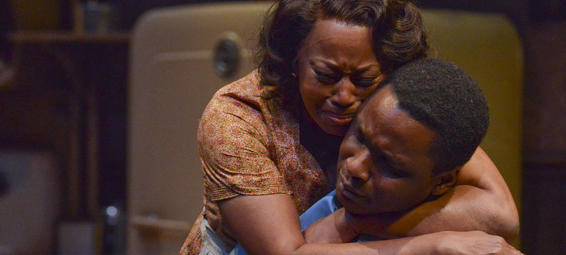The poet Langston Hughes lived nearly twice as long as the writer Lorraine Hansberry. The two reportedly met, briefly, in the 1950s, around the time Hughes wrote the poem “Harlem.” Hansbury was gathering further inspiration for what would be her seminal work, A Raisin in the Sun, a play of nearly perfect dramatic structure and lasting significance that gives a complex response to Hughes’ question: what happens to a dream deferred?
A Raisin in the Sun concerns the Younger family—matriarch Lena (Liz Mikel), daughter Beneatha (Dallas Theater Center acting company member Tiffany Hobbs), adult son Walter Lee (Bowman Wright), Walter Lee’s wife Ruth (Ptosha Storey), and their young son Travis (Christopher Adkins)—living crowded together in a dilapidated, roach-infested apartment on Chicago’s South Side. They share a communal bathroom with the building’s other tenants; Travis sleeps on the couch. The family is expecting a $10,000 insurance check in the mail, a world-changing amount of money made possible by the work-wearied life and death of Walter Senior, Lena’s husband.
Each member of the family has a dream and an opinion on how that money might satisfy it, and no one is more vocal than Walter Lee. No one, of course, except his mother. Walter chafes under her roof and her rules, and longs for a great many things beyond his job as a chauffeur for a white man. He wants the money to invest in a liquor store business. Lena wants to buy a house for the family and save the rest to pay for Beneatha’s medical school. In the end, Lena gives in, putting a down payment on the biggest house she can afford—which happens to be in an all-white neighborhood, much to the neighborhood association’s dismay—and turning the rest over to Walter on the condition that he put part of it in the bank for his sister. Everyone is on the cusp of his or her greatest personal achievement: Beneatha, almost as sophisticated and self-righteous as a medical degree suggests; Lena, almost the mother who could give her children everything; Walter, almost the man he imagines he was born to be.
Directed by the Jubilee Theatre’s Tre Garrett, the Dallas Theater Center’s season opener feels at war with itself, struggling with twin desires to entertain and educate. The results are uneven. When the play is funny, it is very, very funny. Hall’s Beneatha, caught between the rich George Murchison and the intellectual Joseph Asagai, a Nigerian who challenges what he calls her “assimilation” of white, American culture, is charmingly pointed and amusing. Storey plays Ruth with muted emotion that shimmers and breaks, like a rainbow or a dam, at just the right time. But moments of deep revelation, despair, and even triumph feel disconnected, though not wholly unearned. For all Wright’s excellent efforts to show us Walter Lee’s complicated soul and well-intentioned heart, his tragedy doesn’t strike hard enough. On opening night, there was laughter during one of his most important scenes. Maybe it was a glitch, but everyone looks much too comfortable, especially when Bob Lavallee’s staging puts us close enough to smell real eggs cooking.
Still, the overall sum is affecting. Mikel gives a mighty performance; her Lena exercises sheer force of will, almost inhuman perseverance, to drag her family through life’s struggles without compromise or cheat. She dominates the stage as a strong woman who bolsters and bandages the weaknesses of character in her son until he finally comes into his own—even though she is partly responsible for those weaknesses, just as circumstance, color, fate, history, and the too-slow march of progress must too bear the burden of fault. And when she tells Beneatha that the time to love a person is not when he or she has done something good and made everyone proud, but when that person has failed miserably to earn our esteem, the reminder stings. We have not loved our neighbor. We have not even loved our wives, sisters, brothers, girlfriends, mothers, or fathers.
It is an unfortunate thing that a revival still feels necessary—and perhaps even more timely in its commentary on race than ever, which is both enraging and profoundly sad. After all, this production is tinged with an earnestness that borders on a desperation for understanding—and for something more than safe, circular conversations. Though she died at 34, Hansberry offered a prescient vision of a future that was hopeful and painfully uncertain. It is both, still, though hope might seem far outpaced. In the end, this production offers optimism, hard-fought and bitterly won, whether or not we—as individuals, as a city, as a country—deserve to feel something so fine.
A Raisin in the Sun will run at the Dallas Theater Center in rotating repertory with the Pultizer Prize-winning Clybourne Park, a play written 50 years later that examines, in part, the life of the white family preparing to move out of the house the Youngers eventually buy.
Photo by Karen Almond for the Dallas Theater Center





